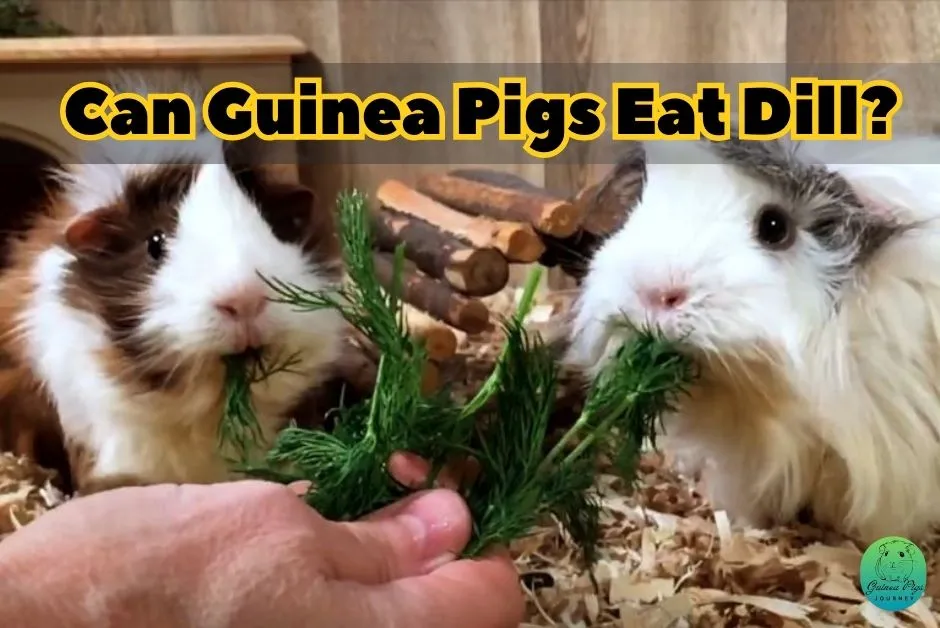Dill also known as dill weed (Anethum graveolens) is an herb found throughout European and Asian cuisines with the leaves having a sweet, grassy flavor. Dill is less common than other herbs such as cilantro or coriander, basil, rosemary, parsley, Thyme, etc. You must try feeding your guinea pigs because my guinea pigs love eating dill. This article reviews the nutritional and health benefits of dill, as well as understanding Can guinea pigs eat dill? And if they can eat dill, do they like it? And how often can guinea pigs eat dill? So, let’s know and understand these questions and more about dill for guinea pigs.
Yes, Guinea pigs love to eat dill in moderation providing several nutrients, and has traditionally been used to treat various diseases, including digestive issues, colic in baby guinea pigs, and bad breath. Fresh dill is very low in calories, yet a surprisingly good source of several essential vitamins and minerals, including vitamin C, manganese, and vitamin A as well as potent antioxidants.
Guinea pig’s nutritional requirements are based on a proper diet plan that you must read for their long and healthy life due to their susceptible and delicate digestive system which requires extra care and understanding of their nutritional needs to keep them healthy and fit. While dill offers healthy benefits for your guinea pigs, it also has some potential risks and allergic issues that you must consider while feeding dill to your guinea pigs as excessive amounts can cause many health-related problems. So, it is equally important to know about all these nutritional benefits, risks, considerations, and other factors of dill for guinea pigs.
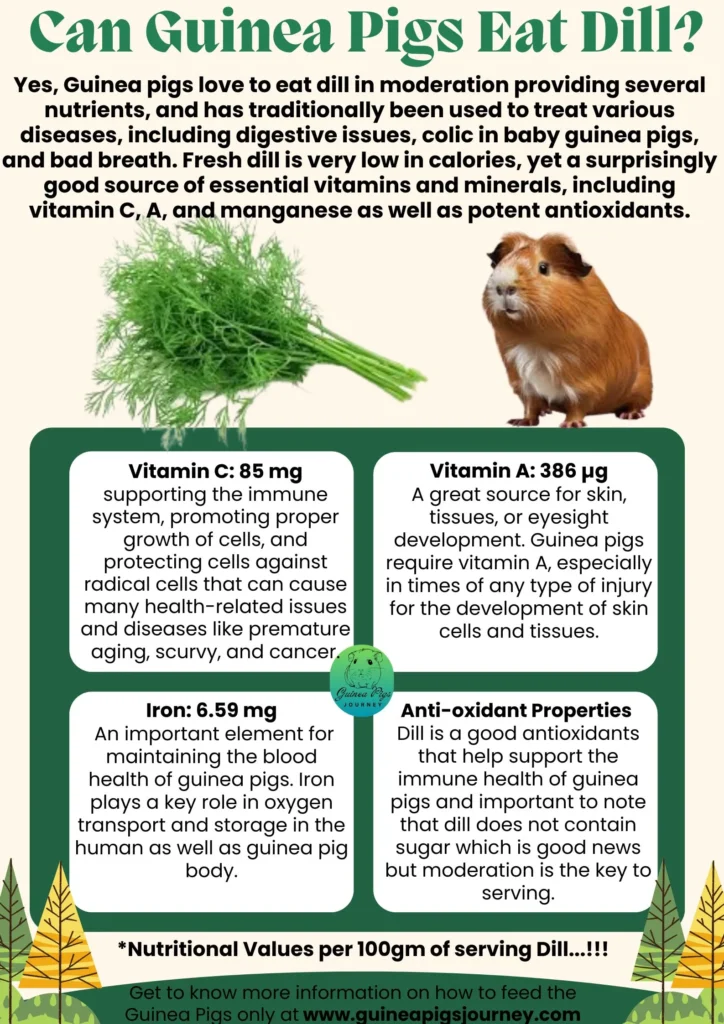
Nutritional Requirements of Guinea Pigs:
The list of safe food including dill and other herbs, leafy greens, veggies, fruits, etc. that can be fed to guinea pigs is so long that needs great care to know the best way of feeding guinea pigs. But not all foods your guinea pigs eat are safe, like jalapenos peppers, pickles, cheerios, olives, meat, etc.; some are toxic and harmful to their health and digestive system. So, you must also know about those foods not recommended to feed guinea pigs for their safe and healthy life.
In general, Guinea pigs require good and fresh quality hay which makes up 80-90 % of most of their diet along with 10 % of fresh and good quality fruits, leafy greens, and vegetables such as sugar snap peas, broccoli, Swiss chard, asparagus, arugula, dandelions, pears, honeydew melon, pomegranate, cherries, plums, etc. as a treat in moderation.
Guinea pigs can also be served with some amount of only dedicated guinea pig pallets but it should not be part of their main staple and regular diet which should be served the recommended portion or mentioned on pallets bag for guinea pigs. Guinea pigs should also be served with fresh, clean, chlorine-free drinking water at all times and must be checked and changed twice a day for their good health.
Dill for guinea pigs can be a nutritious addition. So, you must know the nutritional analysis of all parts of dill for guinea pigs so that you can decide on the quantity and portion of serving as well as the values and percentage of nutrients available with dill for guinea pigs to ensure moderation.
Nutritional Analysis of Dill for Guinea Pigs:
According to the USDA food database, dill is an excellent source of fiber, vitamins, and minerals including vitamin C, vitamin A, manganese, iron, and calcium. But excessive of anything in guinea pigs’ diet including dill can be harmful. So, you need to know the appropriate serving size and portion as well as nutritional content about dill for guinea pigs’ better health and performance. Listed below are the nutritional values and percentages per 100 grams of raw dill for guinea pigs to understand the values and percentages of these important nutrients dill for guinea pigs contains and how much dill is too much for a guinea pig for optimum health benefits.
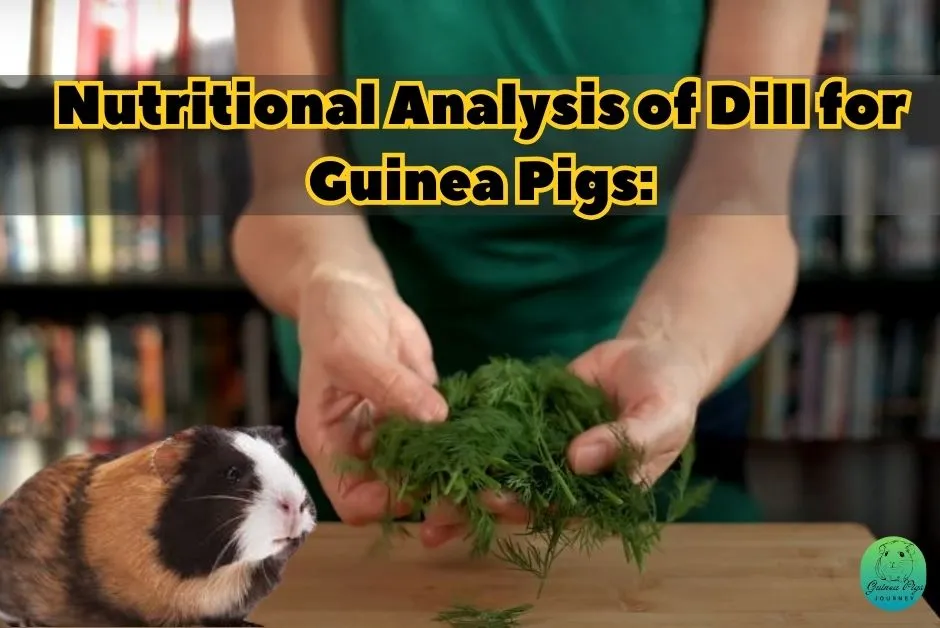
| Nutrients | Value per 100 grams | Daily Value (DV %) |
| Calories | 43 kcal | |
| Carbohydrates | 7.02 grams | 3 % |
| Water | 86 grams | |
| Fat | 1.12 gram | 1 % |
| Protein | 3.46 grams | 7 % |
| Dietary Fiber | 2.1 grams | 8 % |
| Sugar | 0 gram | |
| Ash | 2.45 grams | |
| Net Carbs | 4.92 grams | |
| Vitamin C, total ascorbic acid | 85 mg | 94 % |
| Vitamin A, RAE | 386 µg | 43 % |
| Vitamin B6 | 0.185 mg | 11 % |
| Vitamin D | 0 mcg | 0 % |
| Cholesterol | 0.00 mg | 0 % |
| Fatty Acid | 0.06 g | 0 % |
| Calcium, Ca | 208 mg | 16 % |
| Phosphorus, P | 66 mg | 5 % |
| Potassium, K | 738 mg | 16 % |
| Iron, Fe | 6.59 mg | 37 % |
| Magnesium, Mg | 55 mg | 13 % |
| Zinc, Zn | 0.91 mg | 8 % |
| Sodium, Na | 61 mg | 3 % |
| Copper, Cu | 0.146 mg | 17 % |
| Folate | 150 µg | 38 % |
Note: * The % Daily Value (DV) indicates how much a nutrient in a serving of food subsidizes a daily diet.
Is Dill Safe For Guinea Pigs?
Yes, dill is perfectly safe for guinea pigs in moderation, it is low in calories and contains no sugar which makes it a perfect addition to guinea pigs’ safe food list. However, dill is also high in calcium and phosphorus which is a great concern while feeding dill to your guinea pigs because excessive consumption of phosphorus can cause dental issues and softening of bones in guinea pigs, whereas too much calcium is also not safe for guinea pigs contributing to the formation of bladder stones in guinea pigs which is very painful for your furry friends.

Fresh dill is very low in calories, yet a surprisingly good source of several essential vitamins and minerals, including vitamin C, manganese, and vitamin A that may support or treat digestion problems, liver problems, urinary tract disorders, infections, and many other conditions in guinea pigs.
It is always recommended to monitor or watch for any kind of allergic signs before introducing dill into your guinea pig diet. Do not hesitate to give a call to your veterinarian for a review and medical checkup of each guinea pig to maintain a healthy life, especially if they have had problems in the past.
What Are the Nutritional Benefits of Dill For Guinea Pigs?
Dill for guinea pigs proves to be a nutrient-rich herb in moderation that may enhance their health in a variety of ways, such as reducing inflammation, improving blood sugar control, boosting immunity promoting heart health, etc. Let’s know what type of nutrients and their benefits Dill contains for guinea pigs.
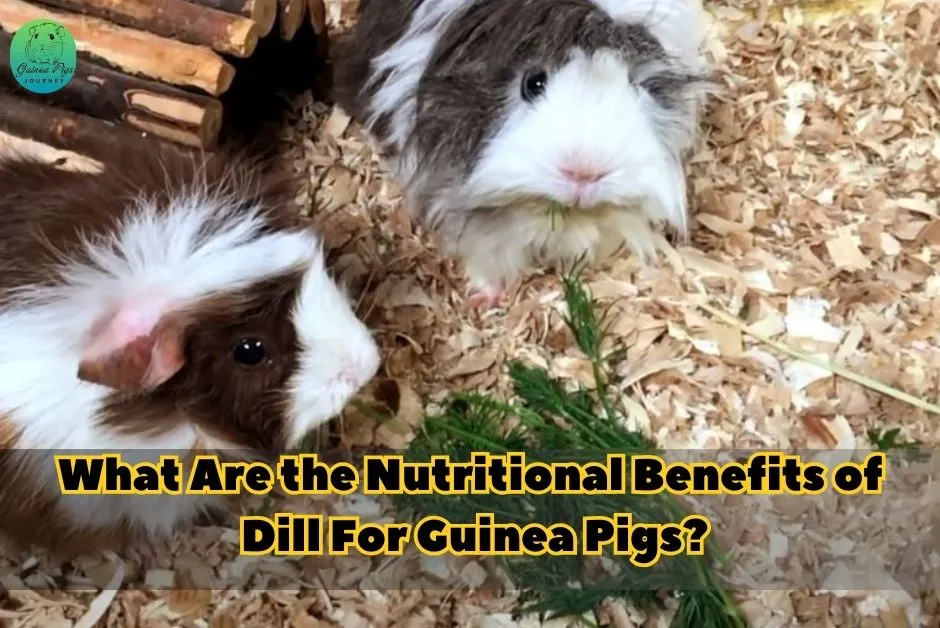
Vitamin C:
Dill for guinea pigs contains 85 mg of vitamin C per 100 grams serving of dill vital for their immune system and helps with bone formation, wound healing, and metabolism in guinea pigs.
Vitamin A:
Dill for guinea pigs contains 386 µgof vitamin A per 100-gram serving of dill which is beneficial for their skin, tissues, or eyesight development and supports a healthy immune system.
Fiber:
Dill contains almost 2.1g of fiber making it a good option in terms of digestion. This will help in good digestion of guinea pigs and it will also be safe from any kind of digestive issue like indigestion, diarrhea, constipation, or stomach upset.
Bone Health:
Dill contains calcium, magnesium, and phosphorus — all of which are important for the bone health of guinea pigs.
Antioxidant Properties:
Additionally, it is a potent antioxidant that helps protect your guinea pig cells against damage caused by unstable molecules known as free radicals.
What Are The Risks Of Dill For Guinea Pigs?

Risk of Bladder Stones:
Dill is higher in calcium than other herbs containing almost 208 mg of calcium per 100 grams serving of dill for guinea pigs which is a point of concern when deciding to offer the amount of dill in your guinea pig diet. Calcium is also necessary for guinea pigs’ health protecting their bones, teeth, etc. but excessive consumption can contribute to the formation of bladder stones. Adult guinea pigs require less calcium intake than young guinea pigs, so it requires great care to feed food high in calcium to avoid any hazard or formation of bladder stones which can be very painful for your furry friends.
Allergic Reactions:
As we know our guinea pigs are easily prone to allergic reactions that may also be due to the addition of any new food like dill in their diet. So, it is very important to watch out for any kind of possible allergic reaction before and after feeding dill. It is very important for guinea parents to consult a vet before introducing any new food or herb like dill to guinea pigs’ diet and always monitor the reaction or any change in guinea pig’s behavior if you introduce any new food to the guinea diet, then immediately contact your veterinarian for further guidance.
Gastric Upset:
Guinea pigs can go through gastric upset due to excessive feeding of dill which can cause diarrhea, vomiting, stomach upset, and bloating that can ultimately affect the overall health of your guinea pigs.
How Often Can Guinea Pigs Eat Dill? (Frequency and Size of Serving Dill)
Dill adds color, flavor, and aroma to guinea pigs’ food list but you must understand the quantity and frequency of serving dill for guinea pigs. Talk to your healthcare provider before offering dill in a guinea pig diet.
However, the recommended frequency is no more than 2-3 times a week while considering other fruits and veggies in their diet to make a suitable and balanced diet chart for guinea pigs.

You can also mix dill with other fresh leafy greens and veggies low in calcium and high in vitamin C and other nutrients like cilantro, mustard greens, green beans, bell peppers, butternut squash, mushrooms, parsnips, pumpkin seeds, radicchio, romaine lettuce, wheatgrass, zucchini, etc. to make it a good treat for your lovely pet while considering the amount and portion of serving by ensuring moderation as a rule of thumb.
How Much Dill Can A Guinea Pig Eat?
The recommended portion of serving dill is almost 10-20 stems of dill for elder and healthy guinea pigs whereas younger guinea pigs may be served with less amount of about 5-8 dill springs per serving in moderation, per guinea pig, and
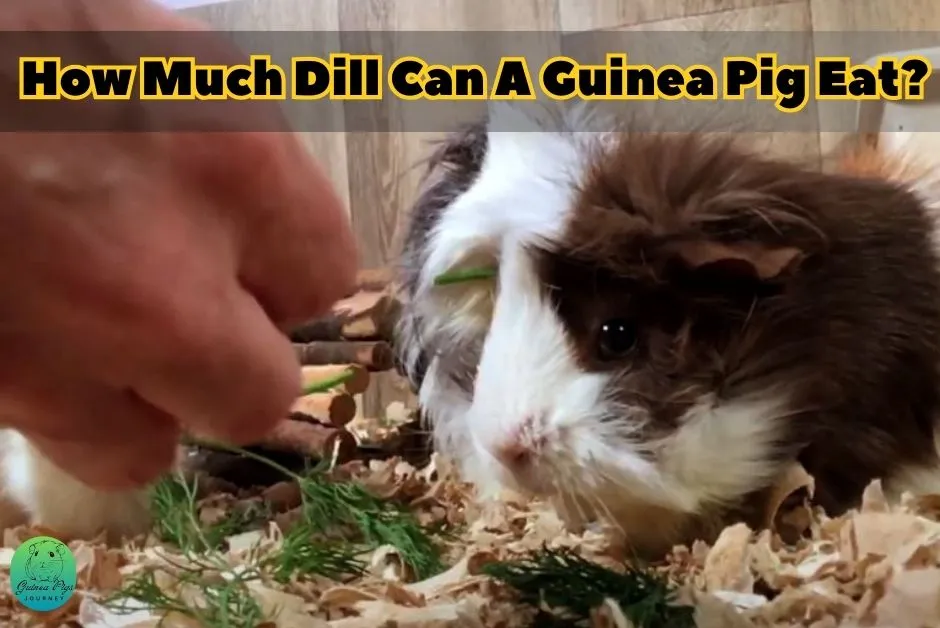
It is important to wash properly in cold water before serving dill but look for any molded or wilted stems before serving. You can also serve ½ amount in the morning and the other half in the evening by mixing it with other suitable vegetables and leafy greens high in vitamin C and other important nutrients.
Can Guinea Pigs Eat Dill Every Day?
No, Dill is not a herb that can be served daily or as a regular diet, so do not offer dill to your guinea pigs every day and as a main staple as they contain oxalate, calcium, and phosphorus, which can contribute to many health risks and complications due to overconsumption like causing dental problems, digestive issues, obesity, weight gain, and even leading to diabetes, etc.
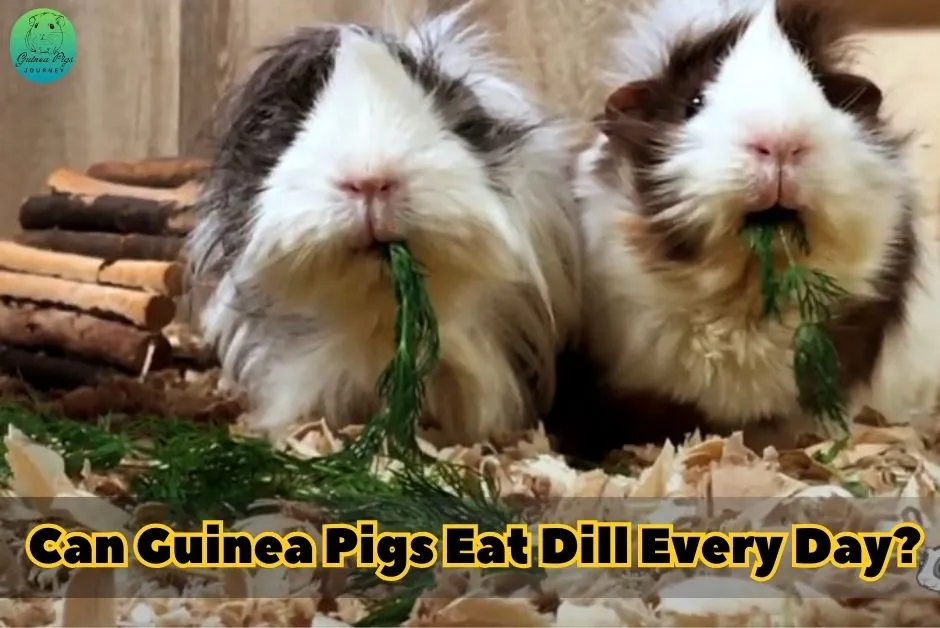
Dill is also high in calcium and excessive consumption of calcium can contribute to the formation of kidney or bladder stones if fed every day. It is recommended to feed dill as an occasional treat in moderation to ensure the good health of your guinea pigs.
Which Parts of Dill Can Guinea Pigs Eat?
Although my guinea pigs love to eat dill in moderation. However, an important question comes to my mind while offering this herb to guinea pigs can guinea pigs eat all parts of dill? Let’s have a look at whether all parts of dill are safe to feed and which parts of dill are not safe to feed your guinea pigs.

Can Guinea Pigs Eat Dill Leaves?
Yes, dill leaves are safe to feed your guinea pigs in moderation after washing them properly in cold running water to remove any dust, pesticides, or chemicals. Dill leaves Contain important plant compounds that have antioxidant, anti-inflammatory, and other health properties.
Can Guinea Pigs Eat Dill Stems?
Yes, Dill stems are safe to feed your guinea pigs in moderation but ensure that stems are not overly wilted. Stems offer many healthy nutrients, minerals, vitamins, fiber, etc. that can also boost their immune system and maintain good health.
Can Guinea Pigs Eat Dill Roots?
Although dill roots have no harmful effect in feeding and your guinea pigs can eat the roots of dill, I would suggest avoiding feeding dill roots as they contain less or no nutritional value for them.
Can Guinea Pigs Eat Dill Seeds?
No, it is not recommended to feed dill seeds to your guinea pigs as it contains oil and our little furry friends do not perform well with oil in their food causing digestive upset and gastric issues as well as diarrhea and bloating. Dill seeds are also high in starch and sugar which are not a healthy option for guinea pigs and may contribute to ingestion, weight gain, and obesity in guinea pigs.
Dill seeds may also pose choking hazards as they may be hard for them to chew and swallow causing choking hazards and gum or dental issues. So, it is best to avoid offering dill seeds to your furry friends.
Can Guinea Pigs Eat Dill Flowers?
Yes, dill flowers are safe to feed your guinea pigs in moderation. Excessive feeding of dill flowers can cause bloating, diarrhea, digestive upset, and gastric issues due to the traces of oil found in the flowers of dill. So, it is recommended to feed in a small quantity to avoid any health complications.
Can Guinea Pigs Eat Dried Dill?
No, it is not recommended to offer dried dill to your guinea pigs as it does not have many more nutrients than fresh and raw dill as most of the nutrients and benefits are broken down once herb-like dill goes through the dehydration process.
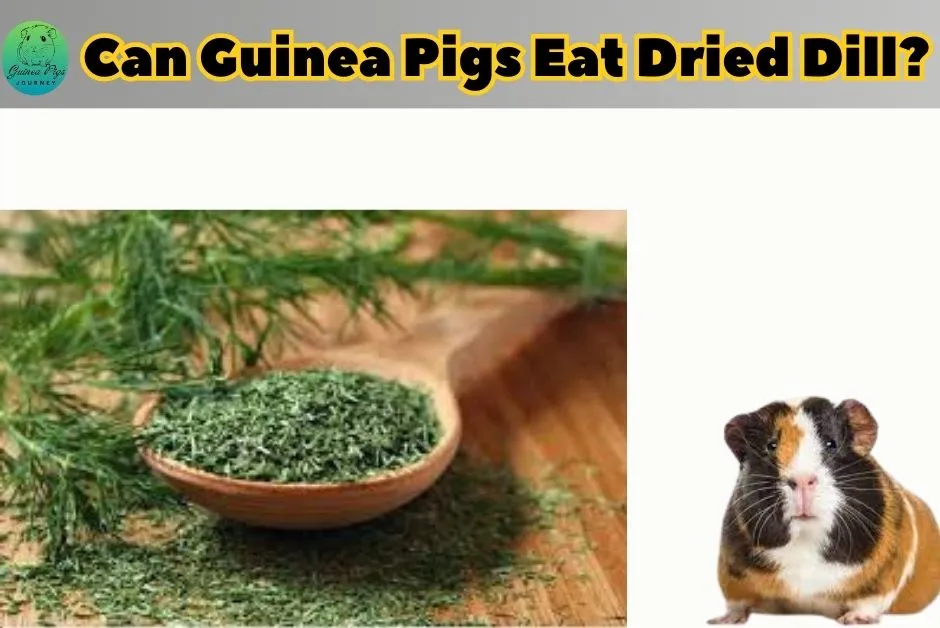
Can Guinea Pigs Eat Dill Pickle?
Not to mention pickled dill, guinea pigs should not be offered any kind of pickle as Pickles are often high in sodium and contain vinegar, spices, acid, and salt which can be unhealthy and harmful to guinea pigs’ health. Pickles high in salt and acid can cause serious digestive issues including bloating, stomach ache or upset, high blood pressure, diarrhea, vomiting, acid reflux, kidney pain, etc.
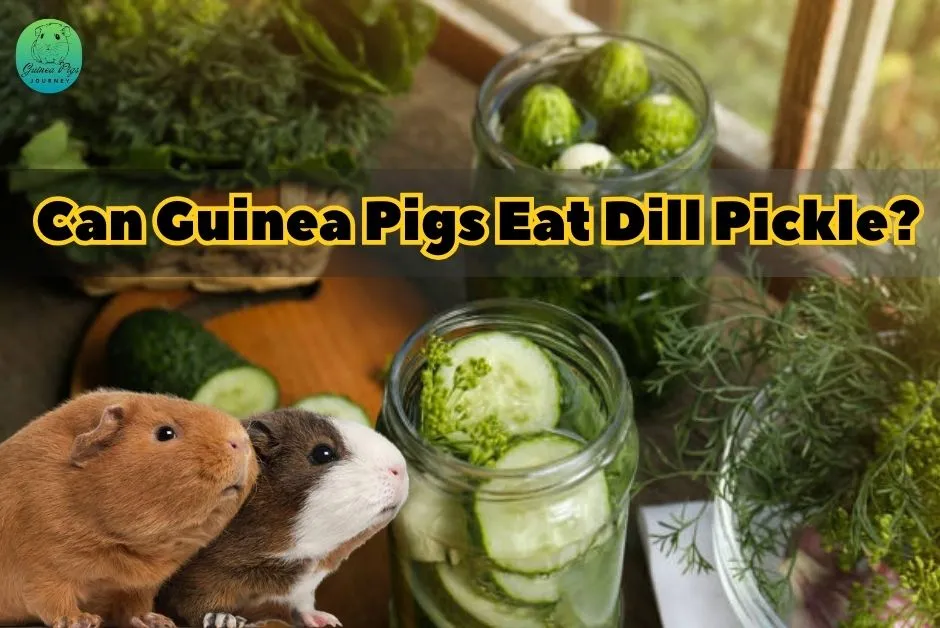
Alternatives to Dill for Guinea Pigs:
Dill is one of the foods that is loved by your guinea pigs but individual preference may vary and some guinea pigs may dislike the dill in their food chart. So there must be an alternative to this herb in their diet to fulfill nutritional requirements. Listed below are some herbs as an alternative to Dill for guinea pigs

| Basil, raw | Kale, raw | Jicama | Pomegranate |
| Parsnips, raw | Kohlrabi, raw | Beets | Tomatillos, raw |
| Rutabagas, raw | Bok Choy | Butternut Squash | Spinach, raw |
| Endive, raw | Pumpkin seeds | Blackberries | Grapefruit |
| Nectarines | Cantaloupe | Wheatgrass | Dragon Fruit |
Conclusion: Dill for Guinea Pigs
Overall, it is safe to feed Dill to your Guinea Pigs. Dill is not only a safe food for your guinea pigs, but also a loved and enjoyed by them offering healthy nutrients, minerals, and vitamins. Always remain up to date for any type of new food including dill before introducing to the guinea pig diet plan. Remember, moderation and gradual introduction are the keys to serving any food and observing or monitoring the guinea pig’s reaction and behavior change or physical response to food. Do not hesitate to give a call to a professional veterinarian in case of any harmful effects or guidance.

